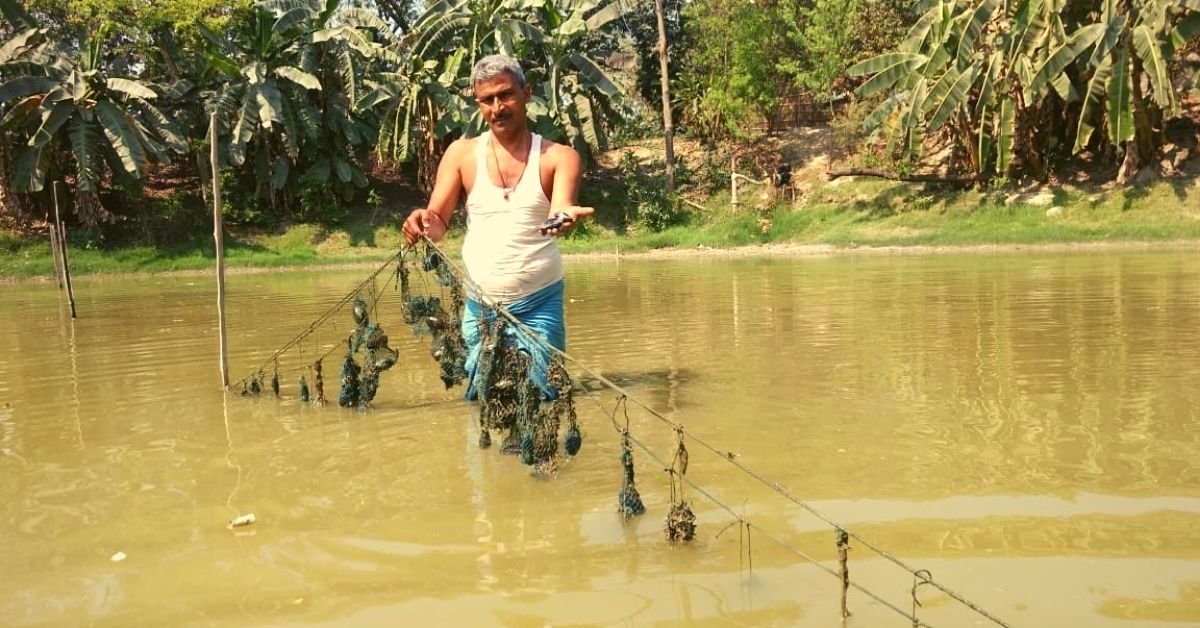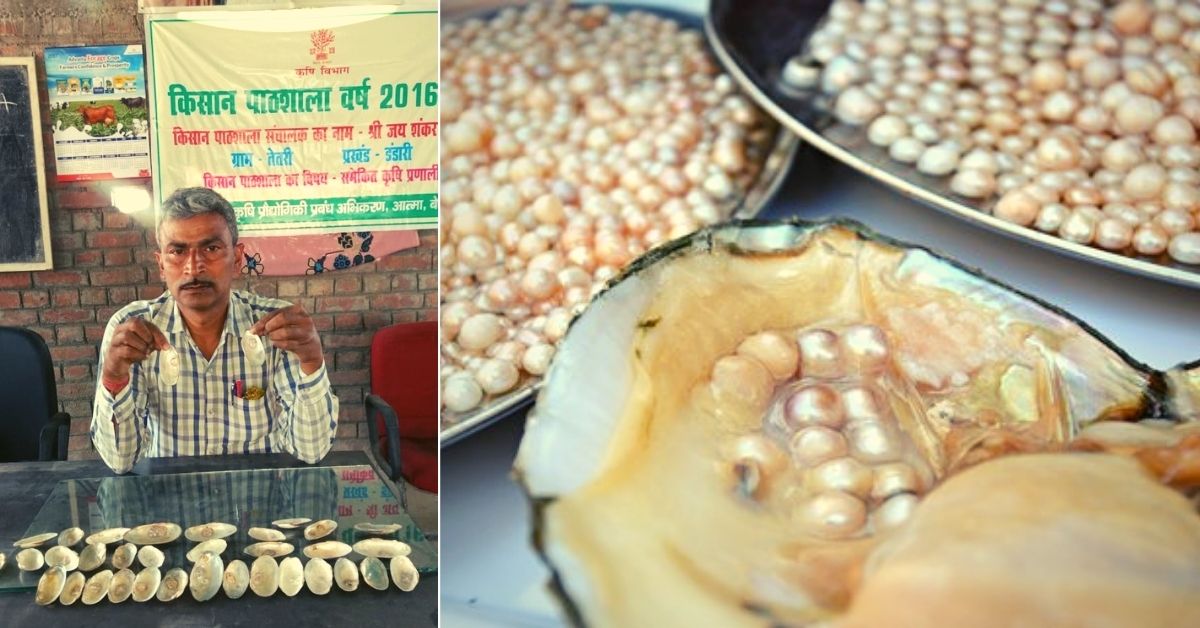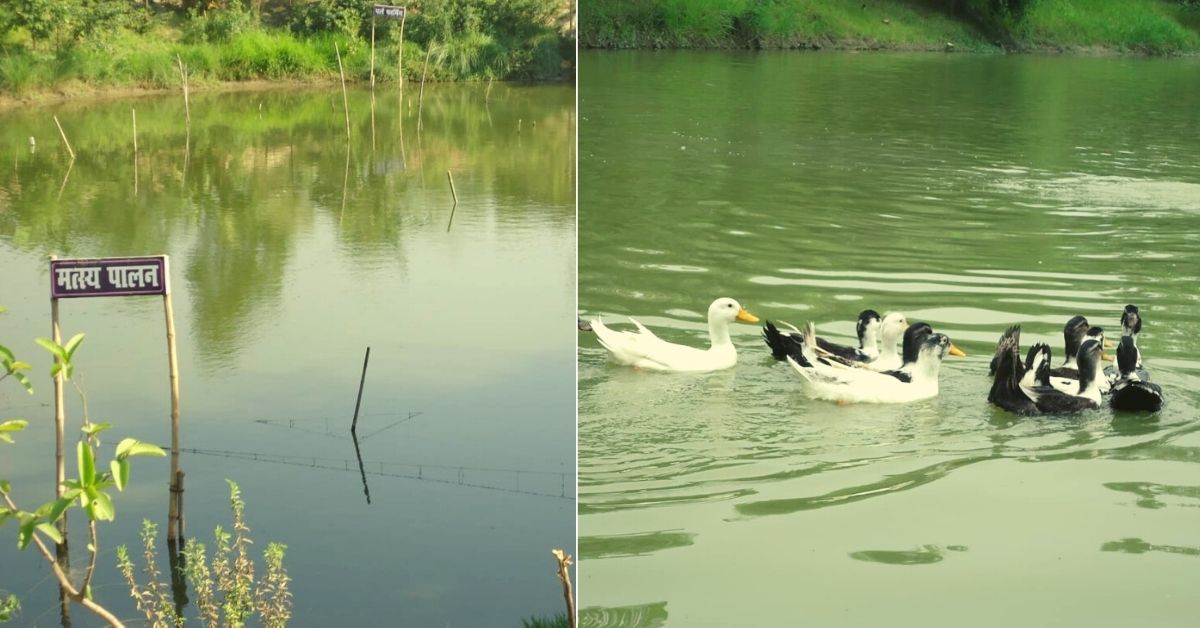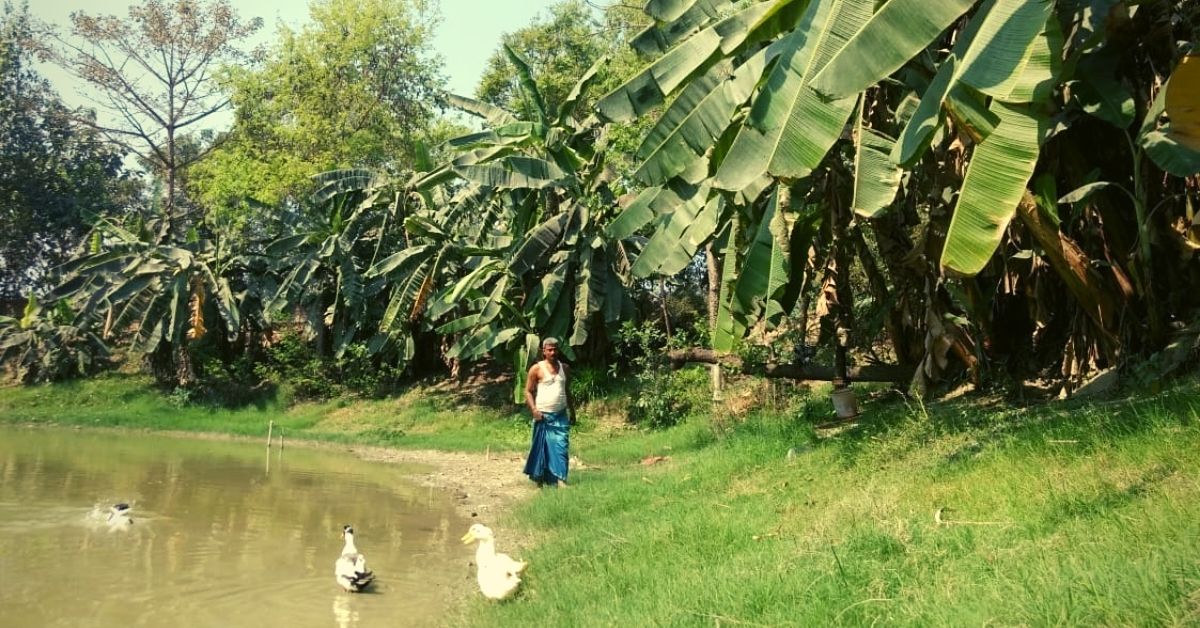Mocked For Leaving Govt Job to Farm Pearls, Bihar Man Now Finds National Acclaim
“With the proper training and right set-up, farmers can earn up to Rs 5 lakh profit annually out of just 1 acre pond.”

“In India people think that a good job is the highest reward education can provide. And so when I, despite having a postgraduate degree in Chemistry, decided to pursue farming, many were shocked. For them, farming was menial work and they would mock me saying- ‘padhe farsi beche tel’,” shares 52-year-old Jaishankar Kumar, from Bihar who today is an early exponent of freshwater pearl farming with 11 years of experience.
Born and brought up in Tetari village, Begusarai, Jaisankar has created a unique symbiotic model of ecological farming in a 1.5 bigha land, with pearl farming complimenting a fishery, organic vegetables and fruits farming, medicinal and herb vertical garden , poultry, vermicompost and biogas production. He claims that a sustainable farm like his can be set up in a land less than 1 acre and can reap profits from several avenues- a lucrative model for all farmers in the state.
What was once mocked and ignored by villagers, today has found national recognition, when Prime Minister Narendra Modi mentioned Jaishankar’s name and his innovative farming techniques especially for pearls during his Mann Ki Baat address last week. After 11 years of hard work, Jaishankar is finally getting his due recognition.
“I was never bothered by the negative comments people said about me and my career choices. But, it’s obviously a welcome change to be recognized on such a big platform. I just hope that this will bring the nation’s attention to the wonders of pearl farming and how it has the potential to change the dynamics of agriculture in India,” he says.
Starting off a pearl farm

Back in 1952, Jaishankar came to know about pearl farming while reading an article in a popular Hindi magazine. Instantly taken aback by its benefits, he began to delve deeper into the subject out of sheer curiosity. At the time, the thought of practicing the same had not yet come to him.
A fresh post-graduate from CM Science College, Darbhanga, he too like many decided to look for a good job. “I come from a very poor family of farmers so having access to higher education was a big deal. After completing my studies with distinction, the natural course was to look for a government job. As nothing satisfactory came my way, I had to settle for a clerk’s job in a high school. But the fire to do something different and make real use of my education was always hidden inside of me. And soon it manifested itself when I decided to pursue my family legacy with a twist, by doing freshwater pearl farming, something that most people in India hardly knew, let alone Bihar,” shares Jaishankar.
Aware of the contribution of Bhubaneswar-based Indian Council for Agriculture Research-Central Institute of Freshwater Aquaculture (ICAR-CIFA), he reached out to them for assistance. The scientists there experienced in pearl farming guided him through the process and provided valuable training whenever needed.
“I did not get an official training from CIFA, but one of their ex-student helped out with on-ground installation and the entire rearing and processing procedure of pearls from freshwater mussels,” he says.
In 2009, he dug up a pond in a 1 bigha land with a 5 ft depth and 15 ft mud boundary. While the pond populated with at least 5,000 mussels provides dozens of bucket-full of pearls annually, he also farms fishes there. Once treated and processed post an entire life-cycle of a mussel, the high-quality pearls sell from a range of Rs 500 to Rs 4,000 each.
Speaking about how lucrative and profitable pearl farming is, Dr. Shailesh Saurabh, senior scientist at CIFA, says, “We are very happy to see Jaishankar get his due recognition and hope that this will increase more awareness around pearl farming. What’s great is that, with the proper training and right set-up after 1 to 1.5 year of culture, farmers can earn up to Rs 5 lakh profit annually out of just 1 acre pond.”
Benefits of growing pearls in ecological farming

Jaishankar explains that he collected mussels from nearby wetlands and freshwater bodies to start his pearl farming practice in a pond. After numerous trials, the mortality rate of mussels began to reduce, producing better quality and bigger pearls with each year.
But, there was a single principle guiding him throughout the process.
“ In natural conditions, mussels produce pearls only as a defense mechanism when any foreign substance enters inside their shell. In farming, one needs to artificially operate them and insert a nucleus as a foreign substance, which over a period of time becomes a pearl eventually. Beyond this artificial intervention, I try to keep the entire process natural. So, instead of growing them in a tank or bucket, I have done so in a pond with fishes, so that all the conditions like temperature and its food of green algae and zooplankton is naturally taken care of. Also, while young mussels a year after their installation can produce 2-3 pearls after each production cycle, processing them not only means killing them to get to the pearls but also harming the natural cycle and settling for a low-quality pearl. Instead, I let them finish their entire life-cycle of 9-10 years and harvest only those pearls. However, in the meantime, each year some mussels die naturally, so that’s when I harvest their pearls as well,” explains Jaishankar.
He also adds that growing fishes along with mussels ensures regular cleaning of the pond, as a single young mussel has the ability to purify almost 40 litres of water at a time. They had the tendency to feed on natural impurities in the water, making sure that the fishes are healthy as well.
“More than ornamental value, pearls and mussels are extremely important for its medicinal qualities. High in calcium and carbon, the powder made out of dead mussel shells is extremely useful to make soil more fertile and so once dead, I use the shell powder for my organic garden as well. It’s contributing to nature’s own cycle,” he adds.

Following this symbiotic principle of farming, Jaishankar has already sold 2000 pearls worth lakhs and also a stock of 10,000 seasoned high quality pearls reared over 10-11 years.
“Pearl farming is an untapped boon for Bihar which has a great resource of freshwater streams. Through proper awareness and government aid, this can be a gamechanger for the state, helping thousands of farmers. I hope to make my farm an example for the youth and help them change for better,” concludes Jaishankar, who has opened his farm as a free training platform for anyone interested in pearl farming.
This story made me
- 97
- 121
- 89
- 167
Tell Us More
We bring stories straight from the heart of India, to inspire millions and create a wave of impact. Our positive movement is growing bigger everyday, and we would love for you to join it.
Please contribute whatever you can, every little penny helps our team in bringing you more stories that support dreams and spread hope.



















